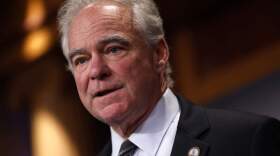SCOTT DETROW, HOST:
President Donald Trump is not one to mince words, and the final weeks of a presidential election are not the time he's going to start. In a series of recent appearances, Trump has made headlines and caused controversy on a wide range of topics. To help us understand what Trump is saying and why it matters, we have NPR political correspondent Danielle Kurtzleben on the line. Hey, Danielle.
DANIELLE KURTZLEBEN, BYLINE: Hey, Scott.
DETROW: Main focus last night, nationally, was on the vice-presidential candidates, of course. But Trump had a couple of speeches himself. He's at a lot of events lately over the past week or so. Have his speeches changed as we get to the final weeks of this election?
KURTZLEBEN: Well, as you just nodded to, he is doing more events. He seems to have a new rally or event every day - sometimes multiple in a day. Now, in addition to that - this is hard to quantify, but in a lot of his recent appearances, he said something more inflammatory than usual. I mean, during his rallies over the weekend, he referred to Kamala Harris as, quote, "mentally disabled" and another time as, quote, "mentally impaired" - so getting even more insulting than usual.
Now, to me, this gets at one hallmark of Trump speeches is that they're iterative. Yes, he improvises in every speech, but each speech contains a lot of the same building blocks. But with each successive speech, he sometimes decides to alter a building block to amp it up. For a while this campaign season, for example, he had been saying Harris was unintelligent. Once on Truth Social, he called her dumb as a rock. He seems to have decided now to take it to this - an even uglier place of calling her mentally disabled.
Now, I have one more example. He often accused Harris of causing crime by allowing undocumented immigrants into the country, but he took that a step further in a speech in Waunakee, Wis., yesterday, where he talked about a woman who was murdered allegedly by someone in the country illegally.
(SOUNDBITE OF ARCHIVED RECORDING)
DONALD TRUMP: I'm outraged that she let in the savage who raped and murdered Rachel Morin. Kamala let her in. She murdered them. In my opinion, Kamala murdered them, just like she did - just like she had a gun in her hand.
DETROW: Danielle, you and I have both spent a lot of time at a lot of Trump rallies. And making outrageous comments and personal insults and false statements are all part of his brand and always have been. But, look, these speeches go on and on - an hour, an hour and a half, sometimes more. There's a lot of stuff that said that just never makes its way to a report that you file. What might some of our listeners not be hearing besides those headline statements?
KURTZLEBEN: Well, by virtue of freestyling so much in his speeches, Trump sometimes says things where it's just flat-out unclear what he means. Here is an example from last week in Pennsylvania, where he was on an extended riff where he was speaking to women voters.
(SOUNDBITE OF ARCHIVED RECORDING)
TRUMP: You will no longer be abandoned, lonely or scared. You will no longer be in danger. You're not going to be in danger any longer.
KURTZLEBEN: Now, like I said, unclear - we don't know what he means in terms of, like, the policy cure for loneliness there. But the point here is that, so often in a Trump speech, he sticks with these broad-strokes ideas of stoking fear, of - whether it's of crime or immigrants. He talks a lot about protecting people. But as he rambles on those points, the particulars often don't make sense.
DETROW: Yeah. We've got about 20 seconds or so left, but one thing to flag is an upcoming event in Butler, Pa., which is, of course, the site of the attempted assassination over the summer. What are you going to be looking for at that event?
KURTZLEBEN: Well, first of all, just the tone - given that it's the site of an assassination attempt, it has the potential to be very angry and dark. Beyond that, just looking ahead, how much he sows the seeds for distrusting the election results. He did that last night. He insinuated to a reporter that he doesn't know if he'll trust the election process. And we know, as we saw on January 6, that can get dangerous.
DETROW: That's Danielle Kurtzleben. Thanks so much.
KURTZLEBEN: Thank you. Transcript provided by NPR, Copyright NPR.
NPR transcripts are created on a rush deadline by an NPR contractor. This text may not be in its final form and may be updated or revised in the future. Accuracy and availability may vary. The authoritative record of NPR’s programming is the audio record.






